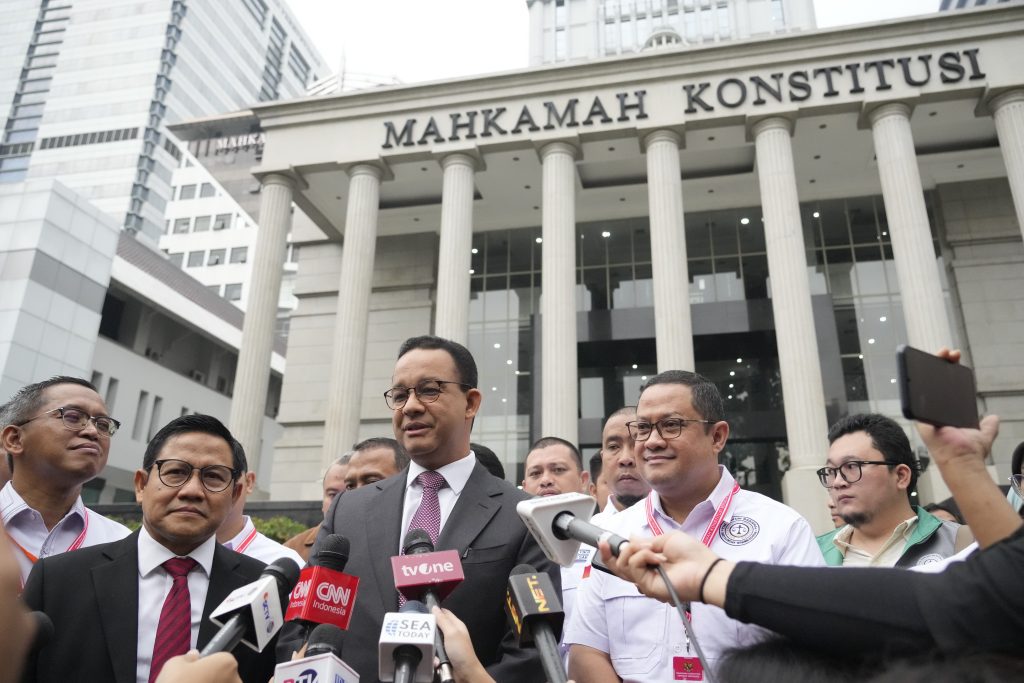Indonesia’s highest court listened to appeals made by two losing presidential candidates who are requesting a new vote, claiming widespread irregularities and fraud during the election, in appearances before the judges on Wednesday.
Defense Minister Prabowo Subianto won the election by a large margin: 58.6%, or more than 96 million votes, according to the General Election Commission — more than double the second-place finisher’s share in the three-way race.
However, the losing candidates — Former Jakarta Governor Anies Baswedan and former Central Java Governor Ganjar Pranowo — argue that the election was tainted by irregularities throughout the campaign. They’re urging the Constitutional Court to cancel the election results and demand a new vote, through separate lawsuits.
Both candidates presented parts of their cases in person, focusing on allegations that the court itself, as well as outgoing President Joko Widodo, twisted laws and norms to support Subianto.
“We observe with deep concern a series of irregularities that have damaged the integrity of our democracy,” Baswedan stated in court.
A group of protesters held a peaceful but noisy demonstration near the court building, vowing to monitor the trial. Authorities blocked streets leading to the court where about 400 police were deployed in and around the building.
Indonesian presidents are supposed to remain neutral in races to succeed them, but Subianto, a long-time former rival of Widodo who lost to him in two elections before joining his government, ran to succeed him. He even selected Widodo’s son, Gibran Rakabuming Raka, as his running mate, even though Raka did not meet the constitutional requirement that candidates be at least 40 years old.
Baswedan and Pranowo argue that Raka should have been disqualified, and are asking the court to prevent him from participating in a new vote. Before the election, the Constitutional Court made a controversial exception to the minimum age that allowed him to run, under the leadership of then-chief justice Anwar Usman, who is Widodo’s brother-in-law. Usman later resigned as chief justice for not recusing himself.
“The Constitutional Court was supposed to safeguard the constitution and prevent arbitrariness, not to legitimize fraud and crime,” stated Todung Mulya Lubis, a well-known lawyer who led Pranowo’s legal team. “This election is an opportunity for the Constitutional Court to regain its authority and dignity.”
Baswedan also mentioned that regional officials were pressured or rewarded to influence political choices, and that state social assistance was used as “a transactional tool to aid one of the candidates.”
A substantial amount of social aid from the government was distributed in the middle of the campaign — much more than the funds spent during the COVID-19 pandemic — and Widodo personally distributed funds in several provinces.
“If we do not make corrections, the practices that occurred recently will be considered normal and become habits, then become culture, and ultimately become national character,” Baswedan said before the eight-judge panel.
Subianto himself went to the highest court two times to contest the election results he lost to Widodo, but the court rejected his claims as unfounded on both occasions. Subianto refused to accept the results of the 2019 presidential election, which led to violence resulting in seven deaths in Jakarta.
Baswedan had the first opportunity to speak in front of the court in the morning, while Pranowo spoke in the afternoon.
“What shocked us all, what really destroyed morale, was the misuse of power,” Pranowo told the court, saying, “When the government utilizes all state resources to back specific candidates, when the security forces are employed to protect personal political interests, then it is time for us to firmly reject all types of intimidation and oppression.”
Chief Justice Suhartoyo, known by a single name like many Indonesians, postponed the hearing until Thursday, when Subianto and the General Election Commission will provide a response. The decision, anticipated on April 22, is final and cannot be challenged.
The case will be determined by eight justices instead of the full nine-member court because Usman, who still serves as an associate justice, is required to disqualify himself.









